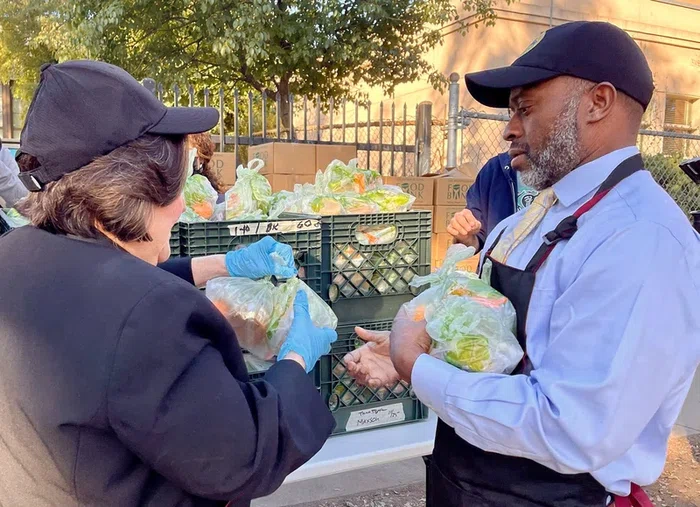News Briefs | FYI
January 27, 2025
Newsom signs order easing wildfire impacts to schools
Gov. Gavin Newsom has signed an executive order to quickly assist displaced students in the Los Angeles area and bolster schools affected by the firestorms.
“We are using the full force of the state government to respond to the Los Angeles firestorms and ensure recovery for the thousands of residents who have been impacted by this unimaginable loss, including school-aged children,” Newsom said in a Jan. 14 news release. “The executive order I signed today will help bring back some sense of normalcy for our youth by eliminating barriers to getting them back learning in school.”
The executive order issued by Newsom will:
- Suspend a number of state rules to allow displaced students to attend school outside of their district.
- Make it easier for schools damaged or destroyed in the fires to use temporary facilities.
- Help schools avoid penalties for not meeting minimum school year requirements.
- Direct state agencies to work with schools with destroyed or damaged schools to develop a plan for serving displaced students and rebuilding.
SPI launches aid for wildfire-affected schools
As wildfires continue to devastate Southern California, State Superintendent of Public Instruction Tony Thurmond is urging Californians to come together in support of impacted students, families, educators and school staff. Tax-deductible contributions can be made through the SupplyBank.org Disaster Relief Fund (www.supplybank.org/disaster-relief-fund) to help provide much-needed assistance.
To help schools avoid funding losses due to closures caused by wildfires, the California Department of Education is encouraging charter schools, school districts, and county offices of education to submit J-13A waiver requests. J-13A waivers are used in cases of emergency school closures to prevent the loss of attendance-based funding. More information can be found on the CDE Form J-13A web page, www.cde.ca.gov/fg/it/j13a.asp.
“Our school communities desperately need our assistance as these horrific wildfires rage across Southern California,” said Thurmond, in a news release. “In times of crisis, Californians consistently demonstrate their resilience and generosity as we continue to deal with the effects of climate change. Let’s continue to unite and support those in need as they work to stay safe and rebuild.”
Thurmond and the CDE have partnered with the nonprofit SupplyBank.org to collect and distribute donations and emergency resources to school communities that are facing the most significant impacts of the wildfires.
The CDE also released updated School Outdoor Air Quality Activity Recommendations last year, providing local educational agencies with resources to make informed decisions about conducting school activities and closures based on local air quality conditions when communities are impacted by wildfire smoke.
ED issues guidance to avoid AI discrimination of students
The U.S. Department of Education’s Office for Civil Rights has issued new guidance to help school districts avoid violating students’ civil rights when using artificial intelligence.
“Avoiding the Discriminatory Use of Artificial Intelligence” was published by the OCR in November and aims to assist schools and colleges in ensuring that AI is used in a nondiscriminatory manner consistent with federal civil rights laws.
“AI technologies have the potential to enhance opportunities and increase educational equity for all students,” according to the guidance. “At the same time, the growing use of AI in schools, including for instructional and school safety purposes, and AI’s ability to operate on a mass scale can create or contribute to discrimination.”
The document provides examples of types of incidents that could present OCR with sufficient cause for opening an investigation. Examples include using AI to spot plagiarism (which could unfairly target English language learners) or using AI-enabled software to create student schedules (which could place more male students in a computer science course than female students based on prior enrollment data).
Read the guidance at content.acsa.org/avoiding-the-discriminatory-use-of-artificial-intelligence.

Meal distribution in Pasadena
State Superintendent of Public Instruction Tony Thurmond joins with Pasadena USD staff and volunteers to pass out “Grab and Go” meals to families, many of whom were impacted by the Eaton Fire. “No student or family should have to worry about meals during this challenging time,” Thurmond said. “Time and again, our education community has shown remarkable resilience and generosity in the face of crisis. Let’s stand together to support these districts as they strive to stay safe and rebuild.”
FYI
Save the date for virtual ACSA Leadership Assembly
ACSA is opening access to its February Leadership Assembly meeting to give all members the opportunity to see ACSA leadership in action and access the professional learning that is a regular part of these meetings. Programming will include a conversation with State Attorney General Rob Bonta, a panel discussion on “Navigating Immigration Changes: Experts Reflect on Supporting Undocumented Students and Families,” a state budget and legislative update, and a wellness session on “10 Microhabits to Avoid Burnout, Boost Collaboration and Thrive!” Mark your calendar for ACSA’s Virtual Leadership Assembly 9 a.m. to 12:30 p.m. Feb. 13. All ACSA members should receive an e-mail with instructions on how to register for this event. If you do not receive an e-mail, please contact Suzanne Caffrey at scaffrey@acsa.org.
ACSA’s CTE and Ed Options councils to meet in February
ACSA members have the honor to serve on committees and councils based upon job-alike functions or sharing a common interest or goal. Occasionally, some of ACSA’s committees and councils offer an open session, virtual networking event, where administrators are able to join others similar in their job position or interest to network and learn. These meetings are open to ACSA members as well as non-members. For 2024-25, several of ACSA’s committees and councils will hold a Virtual Networking Event. Upcoming events include Career Technical Education (Feb. 25) and Educational Options (Feb. 26). Please visit www.acsa.org/committees-councils to register and for the most up-to-date information as times and dates are subject to change.




